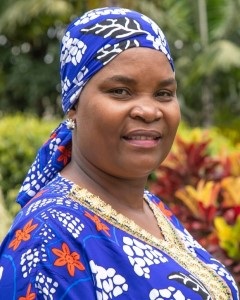- WFF Theme 2023: Agrifood systems transformation accelerates climate action
- bringing together the WFF Global Youth Forum, the FAO Science and Innovation Forum (FAO SIF) and the FAO Hand-in-Hand Investment Forum, the WFF will foster an intergenerational dialogue among agrifood stakeholders, and advance bold and actionable solutions to catalyze the transformation of our agrifood systems to enhance climate action.
FAO SIF 2023 facilitated sharing experiences and lessons learned on implementing concrete solutions on the ground to step up climate action, supporting Members to accelerate efforts towards achieving the Sustainable Development Goals (SDGs) and the FAO Four Betters, leaving no one behind.
Extracts of the programme
19/10 Enabling research, science, and innovation in Low- and Middle-Income Countries and Small Island Developing States
Speakers included
- Patrick Okori - Executive Secretary of RUFORUM - a network of 163 Universities in 40 countries of Africa.
19/10 Technologies and innovations for multi-hazard resilient agrifood systems
This event presented examples of disaster and climate solutions for agrifood systems and people depending on them (e.g. geospatial risk mapping; early warning systems; shock responsive and risk informed social protection; integrated fire management).- Emmastella Gakuo, an Innovations management practitioner and entrepreneur, co-founded and directs operations at Savanna Circuit Tech, a Kenyan-based manufacturing and distribution firm. Specializing in climate-smart post-harvest management, they employ IoT-enabled mobile solar coolers and dehydrators with seamless software integration to reduce post-harvest losses.
19/10 Case studies of agrifood system technologies and innovations for climate action
The session highlighted inspiring success stories of technologies and innovations at the crossroads of agrifood systems transformation and climate action. These success stories come from an FAO call soliciting illustrative country level case studies of agrifood system technologies and innovations for climate action in different regions. The session concluded with the launch of the second round of the FAO-IAFN Accelerator Mentorship Programme for Women-led SMEs in Africa, with selected mentees showcasing how their businesses contribute to climate action.
- Anaporka Adazabra Anaporka Adazabra is a founder and the CEO of Farmio Limited, an innovation that leverages web and mobile technologies, climate-smart agriculture technologies, and precision farming principles to provide full value chain solutions for farmers, Ghana
- Anne Ewurabena CEO of Perfections, a food manufacturing company that specializes in crafting keto-friendly, gluten-free, and vegan products currently sold in Ghana, Kenya, UK, Canada and USA. UN-FAO mentor for the SME Accelerator programme.
- Cassandra George Cassandra has co-founded four successful companies in Nigeria. These companies have not only contributed to the Nigerian economy but have also created job opportunities, fostering local talent and growth in the economy.
- Abebe Haile-Gabriel FAO's Assistant Director-General and Regional Representative for Africa
- Ehab A. Ibrahim chief researcher at the Horticulture Research Institute, Agricultural Research Center (ARC), Egypt.
- Pauline Mounjouenpou senior researcher at IRAD, Cameroon
Her research is on the prospective approach of traditional food processing systems, and their implication on quality, environment and resulting innovations.
She presented a bio pesticide based on cassava peels to conserve grains.
Production d’un biopesticide à partir des épluchures de manioc et savalorisation dans la conservation des grains # 7 p.
The main conventional method of antifungal control consists of the use of chemical pesticides, despite its major harmful effects both for consumers and for the environment and biodiversity. It therefore becomes important to think of new ways of preserving food that are less expensive, easy to implement and not harmful to the environment. The in vitro study of the antifungal activity of extracts from cassava peels “0110” on eleven mold isolates isolated from foodstuffs showed an effective fungicidal effect. This helps protect treated foods against contamination by mycotoxins and reduces post-harvest losses by at least 70% during storage.
Her results have made it possible to develop several innovations which helped improving producers’ income and alleviating food insecurity issues and malnutrition in Cameroon. In 2020, the results on cassava research activities allowed her to win an award of scientific excellence. She is a member of many society learnings and author of a hundred scientific publications, Dr Mounjouenpou coordinated several multidisciplinary research projects and has supervised the research work of about fifty students. Pauline contributed to improving the livelihoods of the producers by the development of simple and innovative technologies that are applicable in rural areas. Thus several technologies have been developed, mainly: chocolate spread, cocoa butter, biscuits based on cocoa and corn flour, cocoa powder, soy - chocolate drink. In addition to these innovative technologies, Pauline also interested in food health security, working on ochratoxin- A. As cocoa and coffee are important export products for Cameroon, my work has focused to the study of the conditions for occurrence and control of this toxin based on post-harvest practices of our producers.
See her presentation @1:40 in the video recording - Eunice K. Mwongera Hillside Green Growers and Exporters Kenya
19/10 Artificial intelligence and digital tools for climate resilient agrifood systems
Bringing together experts, researchers, policymakers, practitioners, and stakeholders from the broadest agricultural and technology sectors, including the International Agency for Atomic Energy (IAEA), the European Commission Joint Research Centre (JRC), the Fraunhofer Institute for Telecommunications- Heinrich Heinz Institute (HHI), Digital Green and with keynote presentations from FAO Director-General and FAO Chief Economist, the event showcased concrete examples of technological innovations that aim at transforming traditional agricultural practices into sophisticated, data-driven systems that will protect efficiently our people and our planet.
Speakers included:
- Qu Dongyu FAO
- Alan Belward Deputy Director at the European Commission’s Sustainability Directorate in the Joint Research Centre Directorate General.
- Sebastian Bosse Interactive & Cognitive Systems Group in the Vision and Imaging Technologies Department, at Fraunhofer Heinrich Hertz Institute (HHI), Berlin, Germany
- Rikin Gandhi Microsoft Research India’s Technology for Emerging Markets team. In 2006, he co-founded what has become Digital Green
- Dejan Jakovljevic Director of the Digitalization and Informatics Division of FAO
- Vincent Martin Director of the Office of Innovation at FAO.
- Najat Mokhtar Deputy Director General and head of the Department of Nuclear Sciences and Application
- Maximo Torero Chief Economist FAO
19/10 Bioeconomy: the catalyst for agrifood systems transformation
Speakers included:
- Joachim von Braun Distinguished Prof. (em.) for Economic and Technological Change at the Center for Development Research (ZEF) at Bonn University, Germany.
- Julius Ecuru contributes scholarly works in the chemical and bioengineering sciences and supports regulatory science and research ethics capacity development.
19/10 Strengthening science-policy interfaces in support of effective decision-making
The FAO Science and Innovation Strategy, a key tool for the implementation of the FAO Strategic Framework 2022–31, focuses on three pillars including “Strengthening science and evidence-based decision-making”, which comprises “science-policy interfaces for agrifood systems strengthened” as one of its desired outcomes. Aligned with the Strategy, FAO is developing guidance for strengthening science-policy interfaces at the national level, helping to ensure that effective policy decisions are made based upon sufficient, relevant, and credible science and evidence, were discussed at the event.- Ms. Sithembile “Thembi” Mwamakamba - Director of Policy Research and Analysis at the Food, Agriculture and Natural Resources Policy Analysis Network (FANRPAN)
20/10 Innovative finance for climate action in agrifood systems
This session explored how financial innovations can unlock more resources for climate action in agrifood systems.Speakers included:
The speakers reflected on the main takeaways and actionable recommendations of the Forum, especially renewed impetus for overcoming systemic and contextual barriers, coordinated actions and the most effective entry points to harness knowledge, scientific advances and innovative solutions for transforming agrifood systems and enhancing climate action.- Dr. Umunay - Senior Environmental Specialist at the Global Environment Facility (GEF) where he manages Food Land Use Restoration (FOLUR) and agriculture and food systems integrated programs.
20/10 Closing: key recommendations and takeaways
Speakers included:
- Alain-Richard Donwahi - President of the 15th COP of the United Nations Convention to Combat Desertification (UNCCD) that took place in Abidjan (Côte d’Ivoire) in May 2022.
- Elizabeth Nsimidala - Agripreneur, President of the Eastern Africa Farmers Federation (EAFF)
- Juan Lucas Restrepo is Global Director of Partnerships and Advocacy, CGIAR, and Director General of the Alliance of Bioversity International and the International Center for Tropical Agriculture (CIAT)











No comments:
Post a Comment